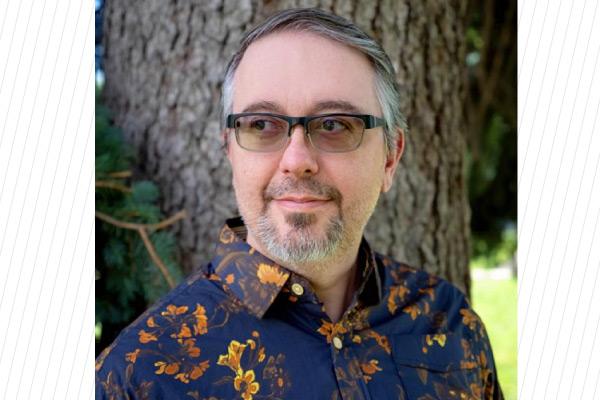ACCAD Welcomes New Director, Chris Coleman

It is our pleasure to announce ACCAD's new Director is Chris Coleman. A warm ACCAD welcome, Chris!
This article was originally written by James Grega and posted September 12, 2024, by the Arts and Sciences Marketing and Communications office.
Chris Coleman was aware of the Advanced Computing Center for the Arts and Design (ACCAD) at The Ohio State University before he even completed his undergraduate degree at West Virginia University.
“I grew up in West Virginia and went to school at WVU and even then, I knew about ACCAD and that it was one of the few research centers in the country that was really thinking about cutting-edge technology and the arts,” Coleman said. “When the opportunity came up to lead ACCAD and work with these amazing people, coming here and meeting everybody really sealed the deal.”
Coleman was hired as the new ACCAD director in the summer of 2024 after spending the last 17 years at the University of Denver, the last five as Director of the Clinic for Open Source Arts.
His connection to West Virginia ties him in with the founder of ACCAD, Charles Csuri, who passed away in 2022 at the age of 99.
“Charles Csuri was an artist who was also from West Virginia. I love the idea that he was trying to combine computer science and art at such an early time in its history,” Coleman said. “I'm trying to pick up that torch and build on it. But of course, ACCAD has had a history of amazing directors over the years.”
Coleman, who has also spent time as a faculty member at SUNY Buffalo, SUNY Fredonia, St. Cloud State University and the University of Oregon, said that what separates ACCAD from other institutions is its longstanding history of collaboration and innovation.
“There weren’t many places that were thinking about this kind of work back in the 1970s. That meant by the time I was hearing about it in the late 1990s, it was a place that was really thinking about 3D animation in cutting-edge ways,” Coleman said. “It really takes a village of different kinds of arts and technologists coming together and ACCAD is rare in how it does that.”
While Coleman has his own ideas for how ACCAD can continue to push forward, he first plans on taking a step back and looking at the center with a wide lens.
“My goal for the first year is to understand all that is ACCAD. In taking on a job like this, you need to understand everybody that's involved and how they're all currently working together before you can steer the ship,” he said.
Ultimately, Coleman’s passion is open-source software, which is software with source code that anyone can inspect, modify and enhance. Current arts software is often expensive to buy or runs on a subscription model, which can both create a financial hardship for creatives.
“As a land-grant university we have a special role in sharing knowledge and sharing tools with a broader and even global community,” Coleman said. “I want to make sure that not only do our students have tools when they walk out the door at Ohio State, but also that we are developing the kind of tools and opportunities that help somebody in another country who might want to speak with their own artistic voice but might not have the means.”
Despite only being in Columbus for a short time, Coleman said he can feel the energy that comes with being at Ohio State. He is excited to begin working with a variety of different departments across the university.
“Ohio State is on a totally different scale from what I came from. The school I was teaching at had 11,000 students. Ohio State has got significantly more,” Coleman said with a laugh. “But at the same time, I've really found that I'm quickly able to connect to people across the university, and everybody's really interested to have conversations about how we can work together. Whether it's medical or it's engineering or it's dance or biology, there's just so many great opportunities.”
